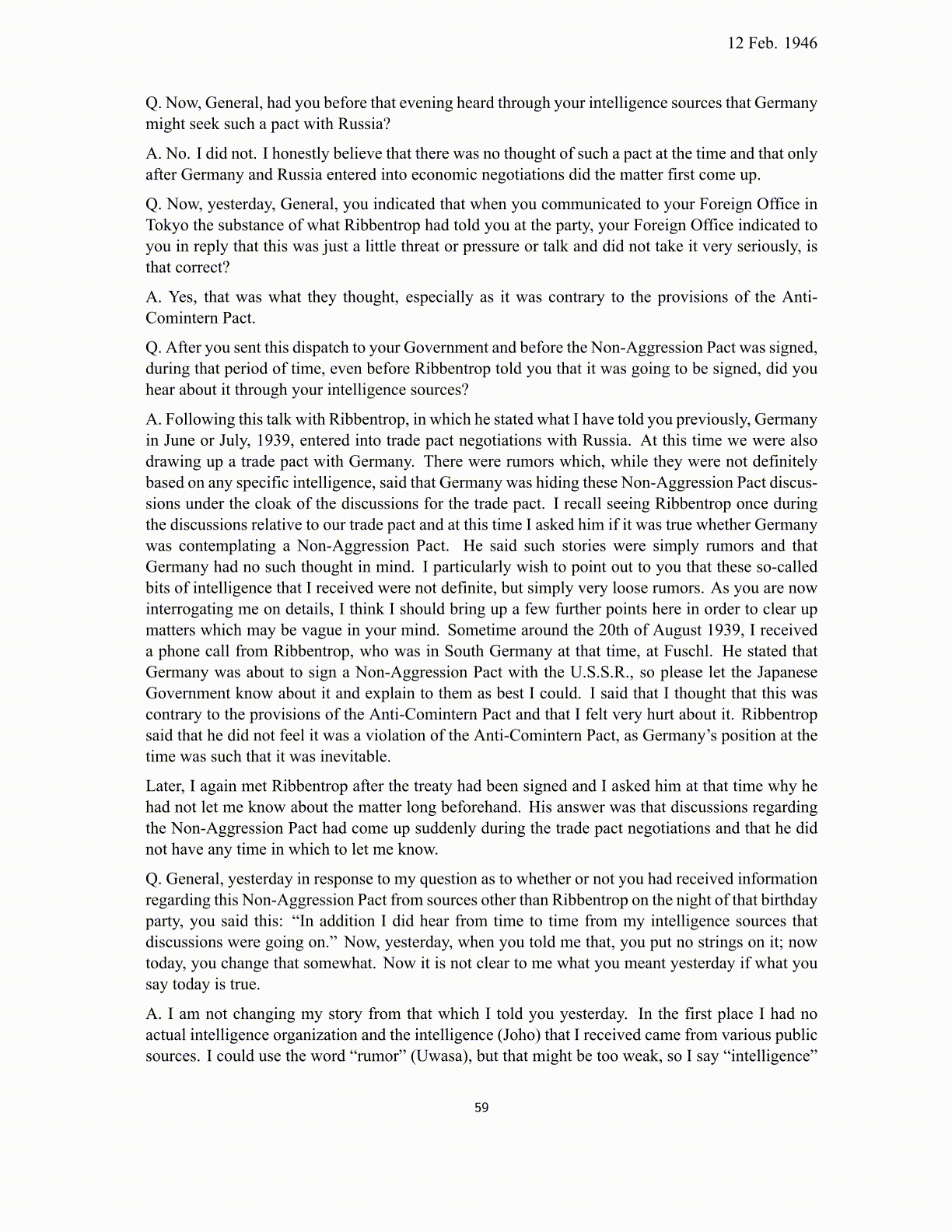
12 Feb. 1946 Q. Now, General, had you before that evening heard through your intelligence sources that Germany might seek such a pact with Russia? A. No. I did not. I honestly believe that there was no thought of such a pact at the time and that only after Germany and Russia entered into economic negotiations did the matter first come up. Q. Now, yesterday, General, you indicated that when you communicated to your Foreign Office in Tokyo the substance of what Ribbentrop had told you at the party, your Foreign Office indicated to you in reply that this was just a little threat or pressure or talk and did not take it very seriously, is that correct? A. Yes, that was what they thought, especially as it was contrary to the provisions of the Anti- Comintern Pact. Q. After you sent this dispatch to your Government and before the Non-Aggression Pact was signed, during that period of time, even before Ribbentrop told you that it was going to be signed, did you hear about it through your intelligence sources? A. Following this talk with Ribbentrop, in which he stated what I have told you previously, Germany in June or July, 1939, entered into trade pact negotiations with Russia. At this time we were also drawing up a trade pact with Germany. There were rumors which, while they were not definitely based on any specific intelligence, said that Germany was hiding these Non-Aggression Pact discus- sions under the cloak of the discussions for the trade pact. I recall seeing Ribbentrop once during the discussions relative to our trade pact and at this time I asked him if it was true whether Germany was contemplating a Non-Aggression Pact. He said such stories were simply rumors and that Germany had no such thought in mind. I particularly wish to point out to you that these so-called bits of intelligence that I received were not definite, but simply very loose rumors. As you are now interrogating me on details, I think I should bring up a few further points here in order to clear up matters which may be vague in your mind. Sometime around the 20th of August 1939, I received a phone call from Ribbentrop, who was in South Germany at that time, at Fuschl. He stated that Germany was about to sign a Non-Aggression Pact with the U.S.S.R., so please let the Japanese Government know about it and explain to them as best I could. I said that I thought that this was contrary to the provisions of the Anti-Comintern Pact and that I felt very hurt about it. Ribbentrop said that he did not feel it was a violation of the Anti-Comintern Pact, as Germany’s position at the time was such that it was inevitable. Later, I again met Ribbentrop after the treaty had been signed and I asked him at that time why he had not let me know about the matter long beforehand. His answer was that discussions regarding the Non-Aggression Pact had come up suddenly during the trade pact negotiations and that he did not have any time in which to let me know. Q. General, yesterday in response to my question as to whether or not you had received information regarding this Non-Aggression Pact from sources other than Ribbentrop on the night of that birthday party, you said this: “In addition I did hear from time to time from my intelligence sources that discussions were going on.” Now, yesterday, when you told me that, you put no strings on it; now today, you change that somewhat. Now it is not clear to me what you meant yesterday if what you say today is true. A. I am not changing my story from that which I told you yesterday. In the first place I had no actual intelligence organization and the intelligence (Joho) that I received came from various public sources. I could use the word “rumor” (Uwasa), but that might be too weak, so I say “intelligence” 59